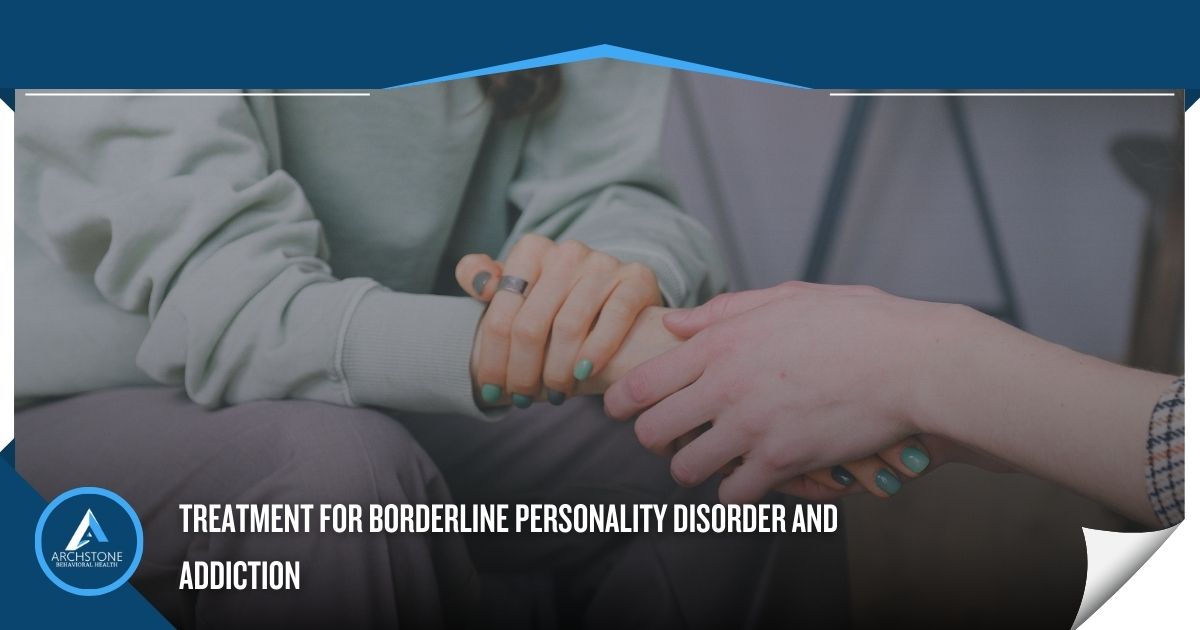Treatment for Borderline Personality Disorder and Addiction
Get Help Now

Borderline personality disorder (BPD) is a mental health disorder. People who develop BPD may engage in harmful behaviors and struggle with interpersonal relationships.
People with BPD may have a higher risk of developing substance use disorders. Individuals with BPD require specialized treatment programs that can effectively treat co-occurring disorders.
This article will explore what to expect from a treatment program for co-occurring borderline personality disorder and addiction. Reach out to the Archstone Behavioral Health specialists now to learn about our comprehensive addiction treatment programs. You may also contact us to schedule an intake assessment or ask questions.
What is Borderline Personality Disorder?
Borderline personality disorder (BPD) is a mental health condition that affects approximately 1.6% of the adult population in the United States. It affects how people relate to others and how they feel about themselves. The symptoms of BPD can make it challenging to function or have healthy relationships.
According to the Diagnostic and Statistical Manual (DSM), the symptoms of BPD include:
- Difficulty with emotional regulation
- An intense fear of abandonment
- A pattern of unstable relationships
- Poor impulse control
- Risky behaviors– having unsafe sex, binge eating, sabotaging relationships, drug use, etc.
- Threats of self-injury or suicide when anxious about abandonment or rejection
- Chronic feelings of emptiness
- Inappropriate or intense anger
- Quickly changing views of yourself, including your goals, values, and self-esteem
- Drastic mood swings
People who exhibit these symptoms of borderline personality must seek treatment. With the right treatment, people with BPD can manage their symptoms. They can feel better, develop healthier relationships, and improve their overall functioning.
Without treatment, some people with BPD may develop more severe problems, including addiction to drugs or alcohol.
The Connection Between BPD and Addiction
People with borderline personality disorder may act impulsively. They may take risks or engage in dangerous behaviors, including substance use. Over time, drug and alcohol abuse can turn into a life-threatening addiction.
Some of the symptoms of BPD can significantly affect a person’s ability to function. Emotional dysregulation, impulsive behaviors, feelings of emptiness, and other symptoms can make living a fulfilling, stable lifestyle challenging. Some people with BPD may use drugs and alcohol to cope with the symptoms of their mental health disorder.
People who use drugs and alcohol to cope with emotional discomfort and mental health symptoms are at a greater risk of developing addiction. Up to 78% of adults with BPD struggle with substance use disorder at some point in their lives.
When someone lives with a mental illness and addiction, addiction specialists call this a “dual diagnosis.”
People with a dual diagnosis require specialized treatment programs. These treatment programs must address the complex roots of addiction and help people manage their mental health symptoms.
What to Expect in Treatment for Borderline Personality Disorder and Addiction
Experts in BPD and the Diagnostic & Statistical Manual of Mental Disorders (DSM) advise that people with a dual diagnosis must receive treatment for both conditions at the same time.
Here is an overview of what to expect during dual diagnosis treatment for borderline personality disorder and substance use disorder (SUD).
Assessment
Before starting treatment, you will meet with medical and mental health practitioners for an assessment. The assessment may include:
- Questions about your current substance use
- A medical and mental health history
- Family history of mental illness and substance use
- Physical exam
- Lab testing
This information will allow your treatment team to recommend the right level of care to meet your needs. Throughout treatment, your team will reassess your needs and adjust your plan as your goals change.
Medically-supported detox
Many people require medication-assisted treatment during detox. During detox, medical and mental health professionals provide continuous care that includes:
- Round-the-clock supervision
- Medications to reduce cravings, reduce the risk of complications, and help you stay comfortable during detox
- Emotional support, including individual and group counseling when appropriate
- Holistic therapies, such as nutrition support, exercise, mindfulness, and others
The care you receive during detox will increase your likelihood of completing detox and avoiding relapse.
Treatment
A dual-diagnosis treatment plan for BPD and addiction may include:
- Individual counseling
- Cognitive behavioral therapy (CBT)
- Dialectical behavioral therapy (DBT)
- Family counseling
- Group therapy
- Relapse prevention education
- Coping skills
- Mindfulness, art therapy, yoga, acupuncture, nutrition support, and other holistic therapies
- Aftercare planning
Dialectical behavioral therapy (DBT), in particular, was developed to help people with BPD. DBT combines cognitive-behavioral techniques with mindfulness, emphasizing acceptance and change, teaching emotion regulation, distress tolerance, and interpersonal effectiveness. It involves both individual and group therapy sessions along with phone coaching to apply skills in real-life situations.
Treatment facilities may offer several levels of care, including:
- Inpatient/residential treatment
- Partial hospitalization programs (PHP)
- Intensive outpatient programs (IOP)
- Outpatient rehab
Many people begin their recovery journey in a residential program and then move on to outpatient care once they are stable.
Find Treatment for Borderline Personality Disorder and Addiction Now
Contact the Archstone Behavioral Health team now to learn about our comprehensive addiction and mental health treatment programs. You may also schedule an intake evaluation, verify your insurance, or ask questions.